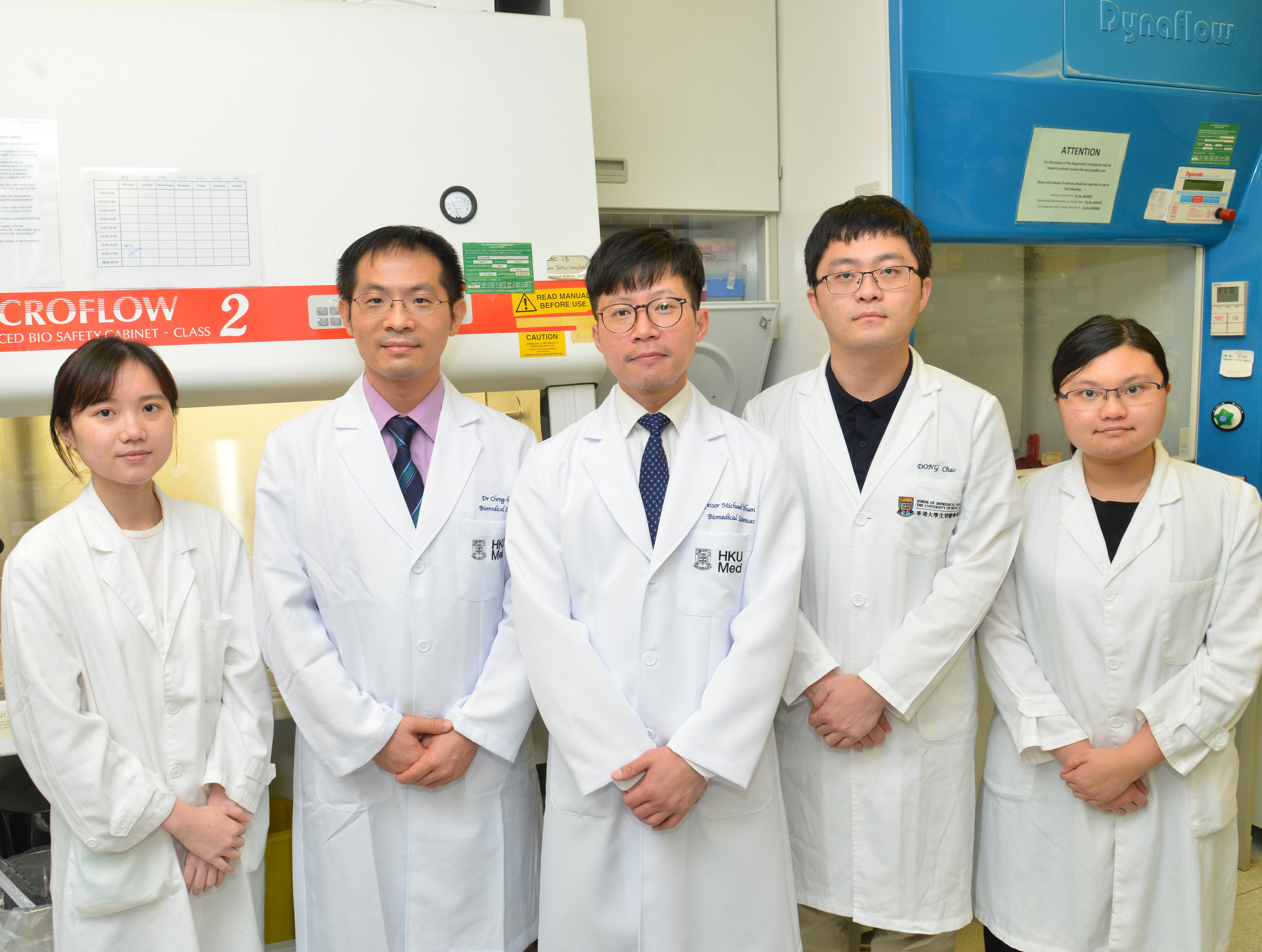Jul 07, 2020
Press Release: HKUMed uncovers novel DNA repair network as promising cancer drug targets
Press Release (2020-07-07):
Source: https://hku.hk/press/news_detail_21261.html
HKUMed uncovers novel DNA repair network as promising cancer drug targets

Professor Michael Huen Shing-yan, School of Biomedical Sciences and Assistant Dean (Innovation and Technology), HKUMed (middle); Dr Yu Cheng-han, Assistant Professor, School of Biomedical Sciences, HKUMed (2nd left); PhD students: Mr Dong Chao (2nd right), Ms Tan Xin-yi (1st left) and Ms Li Jun-shi (1st right) of the Michael Huen Laboratory, School of Biomedical Sciences, HKUMed.
While a myriad of DNA repair networks, many of which represent cancer biomarkers and drug targets, are in place to counteract as many as 70,000 DNA damaging events per cell per day, the most important one that specialises to protect the gene-coding fraction has remained elusive. The gene-coding fraction makes up roughly 5% of our DNA, but because it encodes for the workhorses of each cell it is especially vital for cell function. Accordingly, researchers at the LKS Faculty of Medicine, The University of Hong Kong (HKUMed) have uncovered a hitherto unidentified DNA repair network, revealing new possibilities in cancer treatment and management. The findings are now published in the leading international scientific journal Proceedings of the National Academy of Sciences of the United States of America (PNAS) (link to the publication).
Background
DNA, where inheritable information is stored, can be damaged as a consequence of cell exposure to a variety of agents, including sunlight and tobacco smoke. DNA, also known as the genetic material, is composed of four types of chemical “bases”, and in specific combination and order, these bases serve as the unique blueprint (i.e. genetic code) for each of the trillion of cells in our body. As such, any events that lead to change in the genetic code can impose devastating impact on the well-being of an organism. Indeed, accumulation of DNA alterations contributes to the development of a wide array of human diseases, including cancer.
According to the Hong Kong Cancer Registry, the number of new cancer cases will rise an additional 40% by 2030, an alarming increase that reflects a growing elderly population. Cancer being the leading cause of mortality in Hong Kong, underscores a gap in knowledge in cancer risk assessments and inefficiency in existing anti-cancer treatments. This calls for research and development of early detection and personalised therapeutic intervention strategies.
Findings
One of the main findings of this study is the discovery of DYRK1B and its network as a new branch of the mammalian DNA Damage Response, a collection of cellular strategies that protect the integrity of our DNA. The DYRK1B gene encodes for a protein kinase, and its increased expression has been associated with carcinogenesis as well as in the development of chemotherapeutic resistance. Moreover, mutations in the DYRK1B gene have been described as the culprit of an inherited form of metabolic syndrome, suggesting that defective DNA repair may also lead to medical conditions such as hypertension and diabetes. The study highlights how DNA repair has diverse roles in human health and longevity.
“Our identification of DYRK1B as a novel DNA repair factor not only explains how its mis-expression may fuel cancer progression, but our findings will guide the development and use of DYRK1B inhibitors for treatment of genome instability-associated diseases,” said Professor Michael Huen Shing-yan, School of Biomedical Sciences and Assistant Dean (Innovation and Technology), HKUMed who led the research. “Given the established links between DNA repair and tumour suppression, these novel DNA repair components will not only serve as biomarkers in cancer risk assessment, but they also represent druggable targets that open doors to new treatment options in this era of personalised medicine.’’
About the Research Team
The research was led by Professor Michael Huen Shing-yan, School of Biomedical Sciences and Assistant Dean (Innovation and Technology), HKUMed, and PhD student Mr Dong Chao, assisted by PhD students Ms Tan Xin-yi and Ms Li Jun-shi of the Michael Huen Laboratory, School of Biomedical Sciences, HKUMed. Key international collaborator included Dr Justin Leung Wai-chung, Assistant Professor of Department of Radiation Oncology, College of Medicine, University of Arkansas for Medical Sciences, USA. Other HKU scientists contributing to the research included Dr Yu Cheng-han, Assistant Professor of School of Biomedical Sciences, HKUMed, and Dr Shirley Sy Ming-hui, Post-doctoral fellow of School of Biomedical Sciences, HKUMed.
The work was sponsored in part by fund from Research Grants Council (Project #C70077-17GF & #177104618).
Media Enquiries, please contact:
Please contact LKS Faculty of Medicine of The University of Hong Kong by email (medmedia@hku.hk).
Reports in local newspapers:
2020-07-08 晴報 Sky Post: 港大揭新DNA修復網絡 助治癌症
2020-07-07 明報: 港大破解DNA修復機制 助研治癌
2020-07-07 星島日報: 港大解構DNA 有望檢測癌病變
2020-07-07 TOPick 新聞: 港大團隊發現全新DNA修復網絡 助未來癌症治療開拓新路向
2020-07-07 文匯報: 港大發現全新DNA修復網絡助抗癌
2020-07-07 HK01: 港大發現新蛋白助修復基因損傷 為延緩癌病變及治療提供研究方向
2020-07-07 香港仔: 港大揭新DNA修復網絡助治癌
2020-07-07 頭條日報: 港大解構DNA 有望檢測癌病變
2020-07-07 經濟日報: 港大揭新DNA修復治癌 解長壽之謎
2020-07-07 巴士的報: 香港大學解構DNA 有望檢測癌症病變
2020-07-07 am730: 解構DNA修復網絡 港大研究作為癌症藥物新標靶
2020-07-07 healthy:D: 港大解構DNA修復機制 有望早期癌症病變檢測

